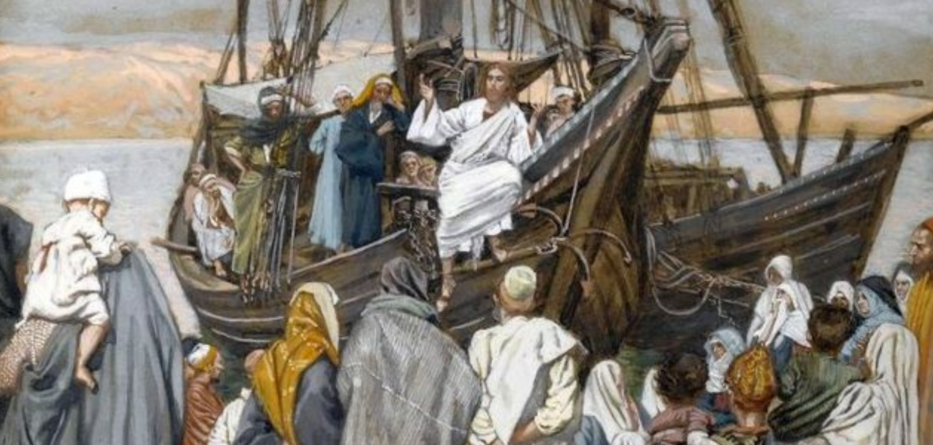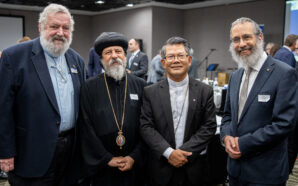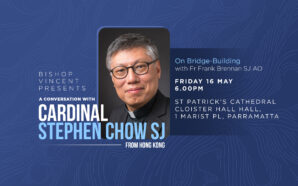Homily for the 5th Sunday in Ordinary Time
Readings: Isaiah 6:1-8; Psalm 137; 1 Corinthians 15:1-11; Luke 5:1-11
6 February 2022
It’s almost two weeks since Pope Emeritus Benedict admitted that he erred in claiming that he had not attended a critical meeting 40 years ago in relation to the placement of a priest who was guilty of child sexual abuse. Benedict said he would be issuing a further statement. While we wait for clarification and any necessary apology, his biographer has claimed the Pope Emeritus had been ‘persuaded to make a false statement’ by members of the team working with him on his statement for the lawyers’ report on the Munich archdiocese. The biographer Peter Seewald said, ‘One made a slapdash mistake [and] the fatal error went round the world as [his] lie.’ [1]
Listen at: https://soundcloud.com/frank-brennan-6/homily-6222
The offending priest had done appalling things in the presence of children, but all these years later Ratzinger (and/or his advisers) wrote in an 82 page written statement: ‘The priest was found to be an exhibitionist but not a perpetrator of abuse in the narrow sense.’ ‘Neither as priest nor as religion teacher did he act improperly in any way.’
And on the homefront of Australian politics we’ve been treated to a round of text messages in which the Prime Minister’s own ministers have been labelling him as being dishonest and lacking in integrity. His Deputy Prime Minister while serving time on the back bench described him as ‘a hypocrite and a liar from my observations and that is over a long time’. Mr Joyce said of Mr Morrison, ‘I have never trusted him and I dislike how he earnestly rearranges the truth to a lie.’
In the wake of these revelations, Mr Joyce has now apologised unreservedly and said, ‘I have worked extremely closely with the Prime Minister over the last seven months since I returned to the role of Deputy Prime Minister; and the Prime Minister is a person of high integrity and honesty in what is possibly the most difficult job in the nation.’[2]
With more and more public disclosures of people’s private thoughts, we are aware of what a complex world we live in. This is the world in which we are all called to minister. We need to make sense of it. We need to know the truth. We need a sense of moral true north. Who can we trust in public life, whether in church or state?
In today’s gospel, Jesus is addressing the crowd by the Lake of Gennesaret. The disciples are like most of us in the wake of revelations from Rome or Canberra. We are not overly interested in parsing the explanations of papal minders and politicians scurrying to put their house sufficiently in order to face a pending election. We are just getting on with our daily lives.
The disciples were fishermen. They had not come to hear Jesus. They were not much interested in the latest preacher distinguishing his teaching from the long accepted teachings of the Torah. They were washing their nets after a fruitless night’s fishing. But they’re the ones on whom Jesus focuses his attention: ‘Put out into the deep water and pay out your nets for a catch.’ Being expert fishermen, they knew this advice was folly but they complied, netted a huge catch, and came to their senses. Simon Peter declared, ‘Leave me Lord, I am a sinful man.’ Jesus tells him not to be afraid. Rather than catching fish for the kill, Simon and his companions are now to catch believers for a new life. They leave everything and follow him.
In 2001 just as Parkinson’s Disease was taking hold, Pope John Paul gave thanks for the jubilee year of 2000 and looked forward to a new millennium with the publication of his Apostolic Letter Novo Millennio Ineunte. He commenced the letter with these words:
‘At the beginning of the new millennium, and at the close of the Great Jubilee during which we celebrated the two thousandth anniversary of the birth of Jesus and as a new stage of the Church’s journey begins, our hearts ring out with the words of Jesus when one day, after speaking to the crowds from Simon’s boat, he invited the Apostle to “put out into the deep” for a catch: “Duc in altum” (Lk 5:4). Peter and his first companions trusted Christ’s words, and cast the nets. “When they had done this, they caught a great number of fish” (Lk 5:6). Duc in altum! These words ring out for us today, and they invite us to remember the past with gratitude, to live the present with enthusiasm and to look forward to the future with confidence: “Jesus Christ is the same yesterday and today and for ever” (Heb 13:8). [3]
The upbeat John Paul went on to say:
‘Now we must look ahead, we must “put out into the deep”, trusting in Christ’s words: Duc in altum! What we have done this year cannot justify a sense of complacency, and still less should
it lead us to relax our commitment. On the contrary, the experiences we have had should inspire in us new energy, and impel us to invest in concrete initiatives the enthusiasm which we have felt. Jesus himself warns us: “No one who puts his hand to the plough and looks back is fit for the kingdom of God” (Lk 9:62). In the cause of the Kingdom there is no time for looking back, even less for settling into laziness. Much awaits us, and for this reason we must set about drawing up an effective post-Jubilee pastoral plan.’[4]
Twenty years later, these words seem naively optimistic. Like all of us, John Paul had no idea that Osama bin Laden was planning the terrorist attack of all time with the assaults on the World Trade Center and the Pentagon – an attack which would transform international politics. Like the rest of us, John Paul had no idea of the tsunami of sexual abuse which was about to engulf the Church. He had no idea that we would be confronting a once in a century pandemic which would stretch into a third year.
For us Christians, there is never an appropriate time for simply treading water or for clinging to terra firma. Whatever the circumstances, we are always being invited to put out into deep water. Paul Kelly the folk singer invokes the sustained existential commission Duc in altum with his lyrics:
Deeper water, deeper water, deeper water, calling him on
So the clock moves around and the child is a joy
But Death doesn’t care just who it destroys
Now the woman gets sick, thins down to the bone
She says ‘Where I’m going next, I’m going alone’
Deeper water, deeper water
On a distant beach lonely and wild
At a later time see a man and a child
And the man takes the child up into his arms
Takes her over the breakers
To where the water is calm
Deeper water, deeper water, Deeper water, calling them on.
Whether we like it or not, we are always being called into deeper water where we can’t trust all those around us. We can’t do it on our own. When we look around us and come to our senses, we, like Peter, declare: ‘Leave me, Lord; I am a sinful person.’ We hear the Lord’s consoling reassurance, ‘Don’t be afraid.’ We are bold enough to believe that we will have sufficient hold on truth and trust to be able to captivate others who are looking for a better life, for life which can be lived to the full. But it can only be done if we travel light, leaving everything that would prevent us from following him who invites us every day: ‘Put out into the deep.’ Duc in altum! Twenty years on, preparing for the next phase of our Plenary Council, we might hear, as if for the first time, the injunction of St John Paul II: ‘Much awaits us, and for this reason we must set about drawing up an effective post-Jubilee pastoral plan.
[1] Peter Seewald quoted in The Tablet, 5 February 2022, p. 26
[2] See https://www.dailytelegraph.com.au/news/nsw/barnaby-joyce-txt-attacking-scott-morrison-leaked-in-second-ambush-on-pm/news-story/5e135c6ee5a0499026269b61800656f7
[3] Pope John Paul II, Novo Millennio Ineunte, #1, available at https://www.vatican.va/content/john-paul-ii/en/apost_letters/2001/documents/hf_jp-ii_apl_20010106_novo-millennio-ineunte.html
[4] Ibid, #15
Fr Frank Brennan SJ is the Rector of Newman College, Melbourne, and the former CEO of Catholic Social Services Australia (CSSA). He has been appointed a peritus at the Fifth Plenary Council of the Australian Catholic Church.








